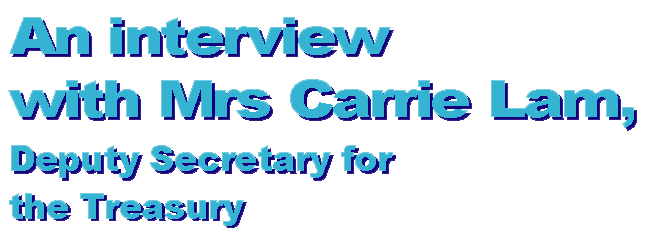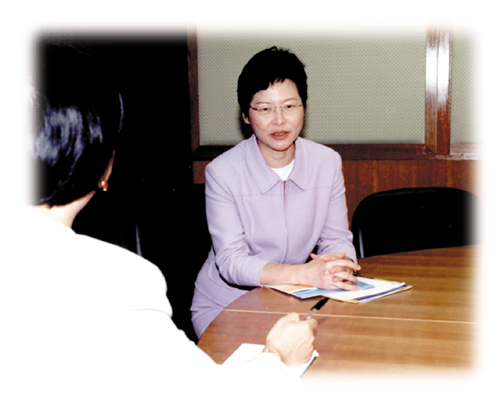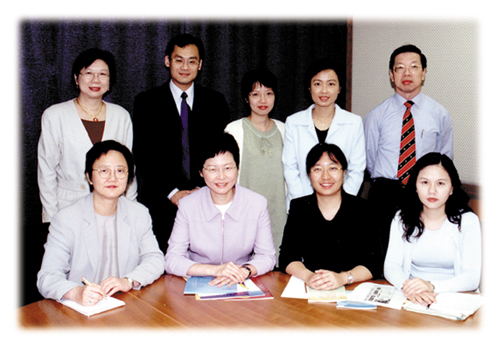| Reporter
: |
the achievement
of 1.2% savings in recurrent expenditure in 2000-01 over and above
the target of 1% suggests that EPP has been successfully implemented,
at least for the initial stage. Can you tell us what are the factors
contributing to this success? |
| Mrs Lam
: |
EPP is a
productivity drive across the Government and the subvented sector.
A scheme of this sort requires a clear mandate from the above which
we have. EPP was announced by the Chief Executive in his 1998 Policy
Address. It is led by the Chief Secretary for the Administration
and has the full support of senior officials. Secondly, we have
allowed for a sufficiently long period for departments and agencies
to prepare for it. Between October 1998 when the target was announced
and the formal commencement of the three-year "savings" period from
1 April 2000, we are talking about an intervening 18 months for
all to gear up to this challenge. Thirdly, EPP has been communicated
rather widely and effectively throughout the public sector. In the
first couple of months, we and CSB colleagues had held numerous
briefings and group meetings. EPP ambassadors comprising FB and
CSB colleagues went to visit each department not only to tell them
what was EPP, but more importantly to listen to feedback. Fourthly,
we have adopted an interactive, problem-solving approach to help
departments undertake EPP. As a result, we have put in place an
environment more conducive to improving productivity. |
| Reporter
: |
can you
tell us more about the environment to facilitate EPP? |
| Mrs Lam
: |
many departments
complained about lack of flexibility in resource management as a
major constraint. We acknowledged that and introduced a one-line
vote on a pilot basis in five departments in 1999-2000. By the way,
we will roll out one-line vote to more departments in 2001-02. Others
felt that spending less than the approved provision was not appreciated
by FB. Accordingly, we removed once-and-for-all the underspending
factor for Departmental Expenses provision in 1998 and in the following
year, created the Save & Invest Account. Some told us surplus staff
was a major constraint. We therefore put in place a central clearing
house to help redeploy surplus staff. This also prompted the Voluntary
Retirement Scheme. We also relaxed the direct procurement rules
and raised the financial ceilings for departments to exercise their
authority. Most importantly, we have not given up the need for continued
effective communication. This is sustained partly through the publication
of the EPP Newsletter. |
| Reporter
: |
what is
your most painful experience in managing EPP? |
| Mrs Lam
: |
finding
enough interesting stories to fill up the EPP Newsletter (joking!)
It is not really pain but some disappointment when people tried
to relate things they don't like to EPP. That is, EPP becoming the
scapegoat. |
| Reporter
: |
are you
confident that the target of 5% savings by 2002-03 will be achieved? |
| Mrs Lam
: |
Yes. I think
most departments have actually drawn up plans to fully deliver the
5% savings within the timeframe. The question now is one of implementation.
With the recent success in reducing the size of the civil service
and the initial deletion of 6,700 vacancies in 2000-01 and the Voluntary
Retirement Scheme to provide satisfactory arrangements for surplus
staff, I am very confident that we will meet the target on time.
|
| Reporter
: |
what is
your greatest satisfaction in managing this programme? |
| Mrs Lam
: |
talking
and interacting with colleagues in departments and in the subvented
sector. Without EPP, my job in resource management in FB would be
far less interesting. We would normally be behind the scene, supporting
other bureaux in their policy formulation. As a result of EPP, I
have many opportunities to attend briefings and seminars for departments
and meet with the media. |
| Reporter
: |
what do
you like most about the EPP Newsletter? |
| Mrs Lam
: |
the experience
sharing columns. In every issue of the Newsletter, we tried to invite
managers from Government or the subvented sector to write stories
for us to share their experience in managing EPP. I am even more
delighted to receive letters from departmental colleagues which
we will publish in the Newsletter. I think experience sharing is
extremely important. People can learn from each other. |




